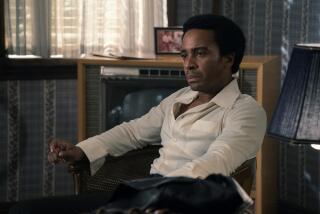Cigar Smoking--for Connoisseurs
- Share via
SAN DIEGO — Raymond Scheurer can still remember the first time he smoked a cigar. “I was 16 years old. I couldn’t smoke it all. And I had to have a bathroom very close,” he said diplomatically.
But Scheurer overcame his initial unenthusiastic reaction to become a connoisseur of the world’s finest cigars. “They’re not products only, but craftsmanship, objects of art,” he said. “So it’s an art to enjoy them, too.
“If a person knows how to enjoy life, then he can enjoy a good cigar.”
That’s not the type of thing a lot of people would say about cigars. A lot of people, when they think of cigars, think of overweight men with damp stubs of tobacco clenched between their teeth, or of acrid smoke that lingers for weeks on clothes and in rooms.
Scheurer, however, is able to make cigar smoking sound like raising Arabian horses or sipping Spain’s best sherries. For connoisseurs, he says, smoking a cigar “is a small part of enjoying life.”
Of course, as international marketing director of Davidoff Cigars, it is Scheurer’s job to serve as a kind of ambassador of fine tobacco. A native of Switzerland, he travels to the United States and other countries every year to make presentations on “The Art of the Luxury Cigar.”
Scheurer was in San Diego recently to speak to the restaurant staff of the Hotel Inter-Continental. The hotel has decided to offer a new line of Davidoff cigars as part of its catering service, and Scheurer was on hand to instruct the staff in the finer points of storing, recommending and serving cigars.
“We’ve had (catered) dinners, mainly attended by men, where we’ve had a demand for cigars,” said Tony Franzetti, the hotel’s manager. “So we decided to offer the best cigars there are.
“I’d like to serve them in the hotel’s restaurants, but it would just open a can of worms,” said Franzetti, a cigar smoker who admits to having been “chucked out” of a few restaurants for lighting up after-dinner cigars. “You please one person and upset 10.”
Scheurer said that for him “the best cigar is after a meal . . . after dinner is just the right moment because it is part of the relaxation (of eating).
“I will not smoke a cigar in a dining room where there is a table close by with some people who are just starting their dinner. The real connoisseur is not an egoist. I might ask (the people at a nearby table), ‘Do you mind if I smoke a cigar?’ If they say no, I’ll say OK.
“But if someone comes all the way across the room to my table and asks me to put out my cigar, I’ll say to them, ‘I’m very pleased to meet you, but I didn’t ask you to join me.’ ”
Scheurer also said that people who complain of “stinking” cigars often do so for a good reason. Inferior cigars are often dipped in brandy or chocolate and wrapped with a paper-like material made from tobacco powder. They smell like burning paper or worse, he said.
But fine cigars are 100% tobacco and are wrapped only with special tobacco leaves, Scheurer said. He unwrapped a few cigars so that the staff members of the Inter-Continental could see the difference for themselves.
An unwrapped cigar is not a pretty sight. It looks like a beef burrito that has come apart. But Scheurer made his point.
During the demonstration, Scheurer repeatedly compared cigars to wines, noting that tobacco ferments and is aged for several years, like wine, before it is made into cigars. The finished cigars should be kept in a place where the temperature and humidity will remain constant. “You wouldn’t store wine on a balcony,” the cigar expert said with a hint of disdain.
Scheurer also instructed the hotel staff on the proper way to light cigars for diners--never with an ordinary match, and never in the mouth. After snipping off the end of the cigar with scissors designed for the purpose, you should use long, non-sulfurous “cigar matches” to light it, he said. Then, holding the cigar in one hand and the match in the other, you should rotate the cigar’s “foot” in the flame until it is lit.
“You should give (the customer) the impression you’re debating whether to give the cigar to him or smoke it yourself,” Scheurer said.
This is one Swiss who clearly knows his cigars. But consider that Scheurer works for Zino Davidoff, a man who once wrote, “The cigar has been my life. I owe it everything: my deepest pleasure and my anguish, the joys in my work as well as my leisure time. . . . The cigar is a friend, a rare one that will never slip away, one you can call upon at any time.”
In “The Connoisseur’s Book of the Cigar,” Davidoff has noted some of the famous personages who smoked cigars, including Winston Churchill, Groucho Marx and Edward G. Robinson. All developed a certain reverence for cigars, but none held them in higher esteem than Rudyard Kipling, who penned the famous line, “A woman is only a woman, but a good cigar is a smoke.”
Scheurer said that the Davidoff company’s philosophy is not simply to market cigars but to be “missionaries of good taste. We don’t want to educate nonsmokers to be smokers, we just want to educate those who do smoke to have more taste. Ninety-five percent of all cigar smokers don’t understand what they smoke--and that’s being generous.”
As to whether smoking cigars is bad for your health, Scheurer said only that “everything, if you do too much of it, is bad for you. Everybody should understand there are limits.” But he added, “Cigarette smokers smoke automatically, unconsciously. The cigar smoker smokes consciously.”
Conscious act or not, some people simply don’t appreciate it, he conceded. During his travels recently he was smoking a cigar in a hotel lobby when a woman sat down next to him, cast a disapproving look at his cigar and said, “It’s awful! It’s awful!”
“The cigar connoisseur is not an aggressive man. He is relaxed,” said Scheurer. “But this woman was aggressive. She provoked me. I didn’t ask her to sit next to me.
“So I told her, ‘Madam, perhaps I can’t stand your perfume, either, so I smoke this cigar.’ ”
More to Read
Sign up for The Wild
We’ll help you find the best places to hike, bike and run, as well as the perfect silent spots for meditation and yoga.
You may occasionally receive promotional content from the Los Angeles Times.






